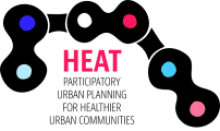Turun kaupunki
Country: FI
Partner budget: 102.415 EUR
Amount of ERDF funding: 73.790 EUR ERDF

P2 Sustainable use of common resources
2.3. Better urban planning in the Central Baltic region
Central Baltic
01.04.2018 - 31.03.2021
823.804 EUR
646.644 EUR ERDF
The HEAT project, realized by partners from Estonia, Finland, Latvia and Sweden addresses the problem of fragmented urban planning and cycling infrastructure. The main reasons are limited participation of citizens and other sectors in the planning processes. Moreover, the initiatives that aim at promoting biking in cities are often fragmented, full of gaps - thus, with low impact. The problem is relevant because of not only environmental concerns but also of health and social issues. Current consulting practices fail to involve city inhabitants and other sectors in the urban planning process to express their needs. People are experts in their city and their view can considerably enrich urban plans. Well-designed urban environments have the potential to enrich health, social and educational functions of a city.
To improve urban planning practices in CB region, the HEAT project proposes to bring city inhabitants and regional and municipal officials at the centre of urban planning by developing new and effective ways of consulting them. People will take part in interactive workshops and campaigns where they will be able to create their vision of biking infrastructure. At the same time, an economic analysis of savings to the health sector through increased biking will provide an argument for future investments. Stakeholders from both the local and regional level will be actively involved in these processes.
The overall objective of the project is to contribute to the planning of healthier, more active and inclusive urban areas in the CB region, in which biking is a safe, popular and acceptable mode of transport. To make this happen, Participatory Concepts for development of biking infrastructure in pilot cities and region of Southwest Finland will be developed and pilot actions will be conducted. Thanks to cross-border cooperation, partners will learn from each other, share experiences and support each other with their specific expertise. Project results will be widely distributed in CB region and beyond.
Country: FI
Partner budget: 102.415 EUR
Amount of ERDF funding: 73.790 EUR ERDF
Country: FI
Partner budget: 53.844 EUR
Amount of ERDF funding: 38.795 EUR ERDF
Country: FI
Partner budget: 133.742 EUR
Amount of ERDF funding: 100.306 EUR ERDF
Country: FI
Partner budget: 78.014 EUR
Amount of ERDF funding: 58.510 EUR ERDF
Country: LV
Partner budget: 21.500 EUR
Amount of ERDF funding: 18.275 EUR ERDF
Country: EE
Partner budget: 92.100 EUR
Amount of ERDF funding: 78.285 EUR ERDF
Country: EE
Partner budget: 220.408 EUR
Amount of ERDF funding: 187.347 EUR ERDF
Country: SE
Partner budget: 121.781 EUR
Amount of ERDF funding: 91.336 EUR ERDF
The HEAT project contributed to the planning of healthier, more active and inclusive urban areas in the Central Baltic region, in which biking is a safe, popular and acceptable mode of transport.
The project developed integrated urban plans with participatory approach: city inhabitants and regional and municipal officials were brought together at the centre of urban planning by developing interactive workshops for consultations. The focus in the urban plans was light transport. In addition to positive environmental impact cycling and walking have, they also produce positive health impact. The health benefits were demonstrated with HEAT tool calculations produced in the project. Furthermore, several campaigns were held to promote the means of light transportation and their positive impact.
As the project result, four integrated urban plans were made. The Finnish one had elements contributing to updating the Regional Traffic System for Southwest Finland and the Estonian plan provided input for Tartu Light Traffic Master Plan. Furthermore, Children's Cycling Park concept was developed for Jurmala in Latvia and similarly, the Swedish Cyckelfrämjandet made a plan to increase children's cycling.